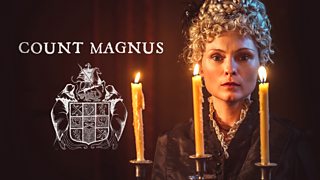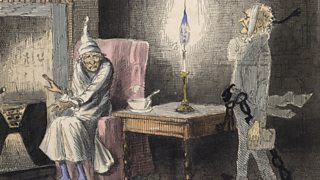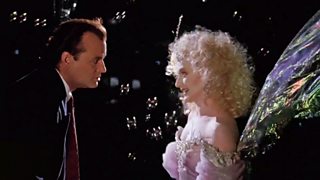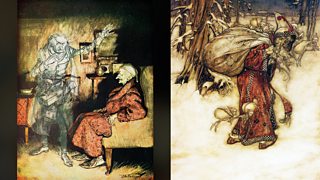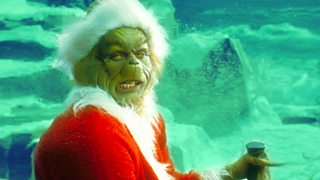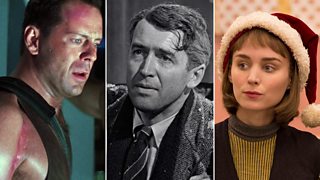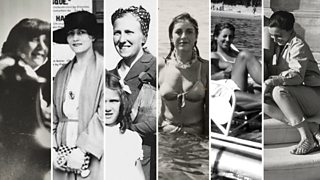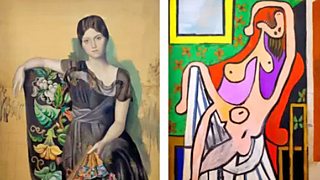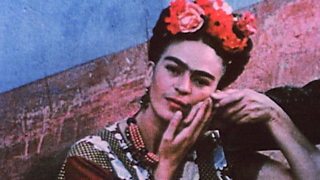Festive flicks: Mark Kermode reveals the secrets of Christmas movies
14 December 2022
Christmas is a rich seam for film-makers to mine, but what are the ingredients that turn a movie into festive gold? For starters Mark Kermode samples the darkness in It's a Wonderful Life and what it shares with A Christmas Carol, godfather of many a yuletide flick. From the Christmas Countdown to Subverting Santa, there are Christmas Cinema Secrets for every taste.


The Scrooge Legacy
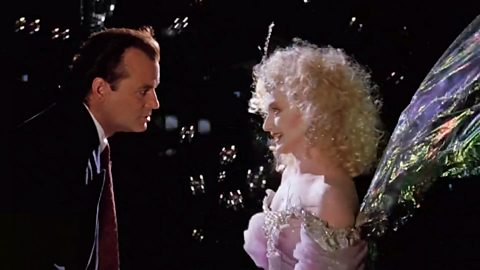
Good ghosts of A Christmas Carol
How the movies have conjured up the ghosts of Dickens's A Christmas Carol.

For Mark Kermode, A Christmas Carol is second only to the Nativity in terms of famous festive stories. He argues that Charles Dickens is the godfather of Christmas films despite the book being published at Christmas in 1843, long before the movie age began.
Murray鈥檚 Frank Cross is a particularly malicious Scrooge because he doesn鈥檛 deny or avoid Christmas; instead he cynically exploits it.
The title role of Ebenezer Scrooge, a Christmas-hating miser, has featured actors including Alastair Sim, Sir Seymour Hicks, Reginald Owen, Albert Finney, George C Scott, Patrick Stewart, Michael Caine and Jim Carrey.
Kermode says: “A Christmas Carol has a dark secret, and it’s one that Dr Seuss understood when he created the Grinch; it's that there’s something about Scrooge’s sheer refusal to 'play nice' at Christmas that makes him a refreshing character who is easy to relate to.”
Beyond direct adaptions of the novel’s story, Scrooge has inspired a whole host of substitute characters who deny, or just don’t get, Christmas. Examples include Henry Winkler in An American Christmas Carol, Vanessa Williams in A Diva’s Christmas Carol and Matthew McConaughey in Ghosts of Girlfriends Past.
Kermode thinks that the best of these loose adaptations is Richard Donner’s 1988 film Scrooged, starring Bill Murray as a cynical TV programmer:
“Murray’s Frank Cross is a particularly malicious Scrooge figure because, unlike some of his screen cousins, he doesn’t deny or avoid Christmas at all; instead he cynically exploits it.”

The Countdown to Christmas
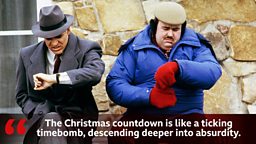
A lot of Christmas films are similar to A Christmas Carol in that they are set before Christmas proper. The put-upon characters must complete a particular task before the big day.
Kermode says: “Thanks to the cruel inventiveness of screenwriters, these simple tasks become Herculean labours. The countdown to Christmas becomes more like a ticking timebomb, descending deeper into absurdity.”
In Nativity!, Martin Freeman has to stage the ultimate school play; In Planes, Trains and Automobiles, Steve Martin is trying to make it home at Thanksgiving to be with his family, amid delays and bad weather; and in Jingle All the Way, Arnold Schwarzenegger is on the hunt for the must-have gift – a Turboman doll.


Subverting Santa
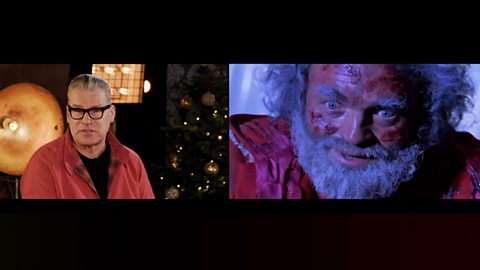
Dark Santas: Movie Santas can have a scary side
Father Christmas isn't always a kind figure. He can sometimes be a scary home invader.

For Kermode: “The notion of a scary Santa permeates cinema, acknowledging the fact that children can as easily be terrified as delighted by the prospect of an old man with a stalker-style list, who’s been watching you all year, and who climbs into your house in the middle of the night when everyone is fast asleep.”
The Scary Santa tradition is particularly strong in European movies, many of which tap into the pagan folklore origins of Yuletide.
John Carpenter’s 1978 horror hit Halloween, says Kermode, “inherited many of its slasher riffs from Bob Clark's 1974 big daddy of yuletide frighteners, Black Christmas.
“Black Christmas was predated by the British Tales from the Crypt, the most memorable section of which is a festive treat called All Through the House, in which a maniacal Santa stalks Joan Collins.”
Kermode argues that even family-friendly Home Alone owes an unacknowledged debt to 36-15 Code Père Noël, Rene Manzor’s 1989 French horror thriller about a resourceful child who defends his house against a homicidal maniac dressed as Santa. He says: “If you were an alien channel-hopping a selection of seasonal movies, you could be forgiven for thinking that it’s the scariest time of the year.”
The Scary Santa tradition is particularly strong in European movies, many of which tap into the pagan folklore origins of Yuletide. For Kermode the most intriguing take on the creepy Santa possibilities is the Finnish film Rare Exports:
“Santa turns out to be a monster who was buried in a frozen mountain a thousand years ago. Now, his evil elves are running amok once more, and it falls to a resourceful schoolboy and his dad to help rein in the mayhem.”
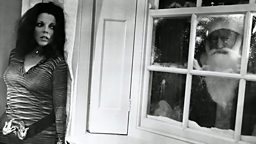
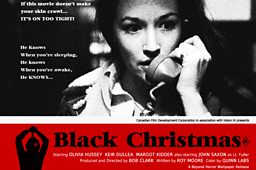


Far From Home at Christmas
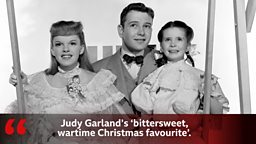
Mary and Joseph spent the first Christmas in the distant town of Bethlehem and Kermode argues that the notion of being displaced from your home runs through a rich seam of Christmas movies, particularly those made or set during a war.
The song became a wartime Christmas favourite, epitomising the bittersweet nature of the Yuletide celebrations.
The song White Christmas was first heard by the American public when Bing Crosby performed it on the radio on Christmas Day 1941, just weeks after Pearl Harbour. The next year it topped the charts after featuring in the movie Holiday Inn.
Kermode says: "The power of a song to bind together people who have been torn apart is one that runs through the pantheon of Christmas movies.”
In Meet Me in St Louis, Judy Garland’s Esther Smith sings Have Yourself a Merry Little Christmas to her sister, who is distressed about a move to New York. “The song became a wartime Christmas favourite, epitomising the bittersweet nature of the Yuletide celebrations for many whose loved ones wouldn’t be coming home this – or any – year.”
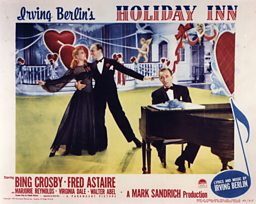

The Healing Factor

Kermode says: “The climax of A Christmas Carol is a classic moment of character change and redemption – someone finally taking responsibility for their mistakes, and committing to try better in the future."
These characters are mended and get back to earlier, better versions of themselves.
It’s a moment echoed in countless Christmas films. For Kermode, the characters of Scrooge in A Christmas Carol, Cross in Scrooged, and Bailey in It’s a Wonderful Life aren’t so much changed by the ghosts and angels who visit them; they are mended and get back to earlier, better versions of themselves.
Likewise John McClane and Holly mend their relationship in Die Hard and the fractious family in Home Alone are reunited and reconciled.
Kermode adds: “For me, the essence of a great Christmas film – the most important secret of this genre of cinema – is the possibility of healing.”
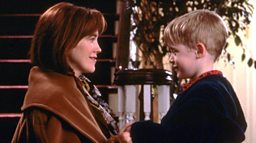
For more on the secrets of festive films, watch Mark Kermode's Christmas Cinema Secrets, 大象传媒 Four on 18 December 2022 at 11.50pm, and on iPlayer for 30 days.
- A version of this article was originally published in December 2018.

Arts Unwrapped
-
![]()
Mark Gatiss on the Christmas ghost story
With Count Magnus coming to TV, The League of Gentleman and Sherlock star reveals why he loves a festive fright
-
![]()
Is this the real Ebenezer Scrooge?
The possible inspiration behind Dickens' Ebenezer Scrooge, literature's most famous misanthropic businessman
-
![]()
Kermode on Christmas: Dark secrets and bad Santas
Mark Kermode's recipe for the perfect Christmas movie... there's one for every taste
-
![]()
The magical worlds of Arthur Rackham
Christmas gift books and the Golden Age of Illustration with A Christmas Carol, Peter Pan in Kensington Gardens and The Night Before Christmas.
Christmas movie magic from 大象传媒 Arts
-
![]()
Merry Christmas
How cinema has brought Christmas cheer to our screens for over a century, from It's a Wonderful Life to Elf.
-
![]()
Kermode on Christmas
From Home Alone and It's a Wonderful Life to action films like Die Hard and slasher favourite Black Christmas, there's something for every taste
-
![]()
Unmerry Christmas
From The Grinch to Bad Santa, this festive trip to the cinema is guaranteed to bring an icy tear to your cheek.
-
![]()
Five life lessons from classic Christmas movies
Unwrapping the hidden wisdom in Christmas movies.
More from 大象传媒 Arts
-
![]()
Picasso鈥檚 ex-factor
Who are the six women who shaped his life and work?
-
![]()
Quiz: Picasso or pixel?
Can you separate the AI fakes from genuine paintings by Pablo Picasso?
-
![]()
Frida: Fiery, fierce and passionate
The extraordinary life of Mexican artist Frida Kahlo, in her own words
-
![]()
Proms 2023: The best bits
From Yuja Wang to Northern Soul, handpicked stand-out moments from this year's Proms
